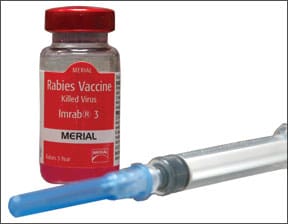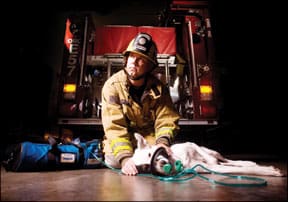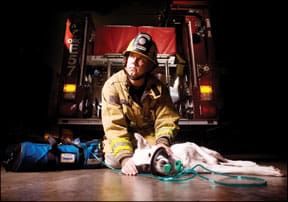More States Change Rabies Vaccine Requirement
Most now allow for a vaccination only every three years
Arkansas canines and their humans have very good reason to celebrate the start of the new decade. That state’s new rule allowing for a three-year rabies vaccine became effective January 1, 2010. This means dogs in Arkansas will need to be vaccinated only every three years (after their initial first-year booster) instead of annually, as was previously required.

288
The majority of states in the U.S. now allow for the three-year vaccination schedule. Despite a slightly premature announcement from the Rabies Challenge Fund (rabieschallengefund.org) last August that all 50 states had accepted a three-year protocol, a few still do not. Rhode Island’s Rabies Control Board approved a change in April of 2009 accepting the three-year vaccination, but as of yet no effective date has been set. Until that happens, Rhode Island dog owners are still required to vaccinate their canine companions every two years. West Virginia also requires vaccination bi-annually. There may be a few others. Still, every state that approves a three-year schedule is one step closer to that 50-state goal.
Meanwhile, the Rabies Challenge Fund is now raising funds for a fourth year of the Rabies Challenge Study at the University of Wisconsin School of Veterinary Medicine. It will cost about $150,000 per year to cover the remaining four years of the seven-year study that hopes to confirm that rabies vaccinations are effective for at least seven years. This would reduce the necessity to vaccinate as often, and minimize exposure to the potentially carcinogenic adjuvant that is part of the vaccine, as well as to the sometimes deadly adverse reactions some dogs experience to the vaccine.
The second phase of the project will finance a study of the adjuvants used in veterinary vaccines and establish a federal adverse reaction reporting system for rabies and other vaccines.
This project depends primarily upon grassroots gifts for funding the costs of conducting the requisite vaccine trials. To date, contributions have come mostly from kennel clubs and private individuals. The Rabies Challenge Fund Charitable Trust is a federally registered 501(c)(3) charitable organization. – Pat Miller
For more information:
Rabies Challenge Fund
rabieschallengefund.org
AAHA to Create New Nutritional Guidelines
Goal is to give veterinarians better tools to help pet owners with canine nutrition
In January, the American Animal Hospital Association (AAHA) announced its plan to create a new set of nutritional guidelines for use by veterinarians and to publish these recommendations in June 2010.
The newly formed committee includes academic leaders, animal hospital directors, and veterinary technicians: Tony Buffington, DVM, MS, PhD, Dipl. ACVN, Ohio State University; Joe Bartges, DVM, PhD, Dipl. ACVIM, University of Tennessee; Lisa Freeman, DVM, PhD, Dipl. ACVN, Tufts University; Don Ostwald, DVM, Dipl. ABVP, Wheat Ridge Animal Hospital, Wheat Ridge, Colorado; Mary Grabow, DVM, Noah’s Westside Animal Medical Center, Indianapolis; and veterinary technicians Julie Legred, CVT, and Kimberly Baldwin, LVT. The AAHA’s goal is to incorporate the latest advancements in medical knowledge, but remain practical enough that veterinarians can use the guidelines to make recommendations to their clients. “It’s time we put nutrition in the minds of veterinarians,” says AAHA President John Tait, DVM. While no details about the scope of the guidelines are available, Tate indicated that poor client compliance (with feeding prescription diets) and the impact of nutrition on pet health are the driving forces behind the decision to create these guidelines.
Another likely factor is the increased interest in homemade diets, especially following the massive pet food recalls in 2007. “Pet owners are inundated with advice from a variety of sources on what constitutes proper quality of care and treatment of their pets. Unfortunately, many of these sources are not credible,” says Dr. Tait.
There are far too many inappropriate or inadequate recipes available to owners, for both healthy dogs and those with health conditions requiring a modified diet. The question is, will the AAHA’s new nutritional guidelines focus on what has been learned about nutrition in the past 10 to 15 years, or will they simply rely on the same high-carb, low-protein formulas that the pet food companies have promoted for so long? Hill’s Pet Nutrition has provided funding for the task force and has promised to help implement the guidelines when they are published, so we’re not overly confident that the new guidelines will be all they could be. We’ll analyze them when they are published, and share our analysis at that time. – Mary Straus
FDA Issues Recall for Ketamine
Drug used as part of anesthesia protocol may be linked to deaths
On December 21, the FDA’s Center for Veterinary Medicine announced the expansion of a nationwide recall of ketamine hydrochloride injectable manufactured by Teva Animal Health following reports linking the drug to the deaths of five cats. Ketamine is commonly used as part of anesthesia induction in both dogs and cats. The first deaths linked to ketamine occurred in October and were reported to Teva in November and to the FDA in December.
Since the initial recall began, more products have been added. As of this writing, all lot numbers that are 7 numeric digits long or that start with “5401” (regardless of their length) have been recalled and should be returned to their distributors. After veterinarians pressured the FDA, it was revealed that Teva also manufactures ketamine for other companies, and the recall was expanded to include the following products:
– AmTech Group, Inc. (Ketamine Hydrochloride Injection, USP)
– Butler (KetaThesia)
– LLOYD Laboratories (VetaKet)
– Phoenix (Ketaject)
– RXV (Keta-Sthetic)
– VEDCO (KetaVed)
– Fort Dodge/Pfizer (Ketaset)
Ketamine is not a drug that pet owners would give themselves, but if your pet is scheduled to be anesthetized, you should check with your vet to be sure that they have all the relevant information about the recall. Veterinarians with questions can contact Teva Animal Health.
Troubles at Teva Animal Health began last July, when the FDA shut down the company and filed a lawsuit after inspectors found adulterated animal drugs at its plant in St. Joseph, Missouri. As a result of the FDA probe of its quality control procedures, Teva agreed to cease manufacture of its generic drugs as well as its DVM Pharmaceuticals product line. At that time, however, none of the drugs Teva produced were considered to be harmful, an assumption that now appears to be incorrect. – Mary Straus
For more information:
FDA’s Center for Veterinary Medicine
www.fda.gov/Safety/Recalls/ucm195118.htm
Teva Animal Health
(800) 759-3664
Organization Facilitates Donations of Pet Oxygen Masks
“Bark 10-4” facilitates donations of pet oxygen masks for fire trucks across the nation
House fires are devastating and life-threatening for everyone in the family – including the pets. It’s estimated that half a million pets are affected by fires each year and more than 40,000 die from smoke inhalation. Emergency first responders can provide oxygen to a fading animal, but they usually face the challenge of working with a human oxygen mask, which is difficult to securely fit over a dog or cat’s face.

288
Last fall, Bark Buckle UP®, a national organization dedicated to pet travel safety, teamed up with Smiths Medical, distributor of veterinary medical devices, to launch Bark 10-4™, a national campaign designed to equip every fire truck across the United States with a pet oxygen mask.
While veterinarians have used animal-specific oxygen masks for years, they have only recently begun to find their way into the hands of rescue personnel. Due to budget constraints, those that do exist are usually donated by compassionate pet owners. “This program will go a long way toward raising awareness about a product that can save a lot of pets’ lives,” says Lisa Huston of Smiths Medical.
To date, the ongoing program has successfully provided more than 2,500 masks to fire stations across the country. Supporters can purchase a single mask for their local fire house for $25, or a mask set which includes a small, medium, and large mask for $65. Sponsorship can be completed at Bark10-4.com or via a link at surgivet.com. The sponsor designates the specific department to receive the gifted masks, which are delivered with the shipping/handling costs paid by Smiths Medical. If a single fire house receives more masks than are needed, the fire chief has the option of storing additional masks for future use or distributing them among local fire houses.
Consider making a donation to the fire department in your town or neighborhood. “The mask only works if it’s on the truck,” said Jose M. Torres, Battalion Chief of “A” Platoon in Santa Monica, California. “Together we can save pets’ lives.” – Stephanie Colman
For more information:
Bark Buckle UP
barkbuckleup.com
Bark 10-4
bark10-4.com






